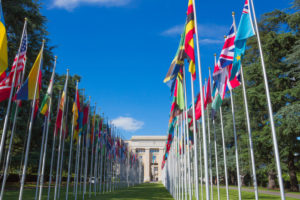Unless you’re an attorney who’s been practicing under a rock for the past several years, you realize that we live in a global marketplace where transnational legal proceedings have become common. Not only is the globalization phenomenon impacting how we buy, sell and trade, it’s also rapidly transforming the legal profession while fueling the growing need for international lawyers seeking a fresh and exciting career pathway.
Armed with cutting-edge technologies including new data analysis and advanced marketing innovations, private firms and corporate counselors based in the U.S. are finding themselves engaged in transcontinental negotiations, mergers and acquisitions inconceivable to most firms merely a decade ago. In lockstep with these client needs, prestigious firms who were once resistant to change are also getting caught up in this whirlwind of globalization, one that will leave them in the dust unless they embrace this brave new legal world.
Globalization is Creating these International Law Opportunities
 Private law firms currently handle most international business transactions. Most are based in New York City or Washington, D.C., but there are others scattered about in smaller U.S. cities. Many of these domestically-based international law firms also operate overseas offices and, if not already, are in the process of acquiring additional, established foreign legal practices through mergers or other expansion means.
Private law firms currently handle most international business transactions. Most are based in New York City or Washington, D.C., but there are others scattered about in smaller U.S. cities. Many of these domestically-based international law firms also operate overseas offices and, if not already, are in the process of acquiring additional, established foreign legal practices through mergers or other expansion means.
It’s becoming commonplace, as they position themselves to survive in a futuristic legal world, for many firms to go global while beefing up their international footprints. One such recent example was when Atlanta-headquartered Sutherland Asbill & Brennan announced a transatlantic merger with U.K.-based Eversheds, resulting in a combined, transnational global legal firm of 2,300 attorneys operating within 29 countries.
Corporate counsel lawyers specializing in international law are also very much in demand, as private companies look to grow their business operations globally. Most of the international attorney career opportunities currently exist in these law specialties:
- International transactions typically carried out by private firms
- International litigation also usually done through private firms
- Nonprofits that operate across international borders
- International organizations like the International Monetary Fund, World Bank or the United Nations’ Legal Counsel Office
- The federal government, most commonly in the U.S. Department of Defense or the State Department
Because most practicing attorneys did not receive much international law exposure during law school, even at some of the more prestigious law institutions, global firms and corporations are taking it upon themselves to provide in-house training. Typically they initially hire lawyers who specialize in:

- Antitrust Law contracts
- Securities regulations
- Trademark and Patent Law
Later, these in-house lawyers are educated in international law. For example, a staff attorney who knows domestic (U.S.) law proficiently may then be cross-trained on international law within a given specialty area such as securities regulation. This new breed of transnational lawyers is being further equipped with cutting-edge technology such as data analytics and advanced marketing tactics.
Artificial Intelligence (A.I.) is, and will continue to be more and more, a partner in this data-meets-marketing futuristic legal business model. Client/attorney personal relationships, which used to drive business in the legal profession, are not nearly as important as they used to be within international law settings. And with borderless partnerships growing as the days go by, corporations and law firms separated by thousands of miles will depend even more on technology-driven, as opposed to human-to-human, partnerships in a global legal world.
Global Legal Recruiters Facilitate International Law Careers
What’s in the cards for the legal profession as globalization continues to transform the industry? By all indications, international law will continue to grow in prominence, driven by advanced technology, and survival will depend on how quickly lawyers and their employers adapt to these manifestations. Better legal recruiters stay abreast of changes in the industry, and understand the globalization challenges rapidly playing out within the law profession.
They also know about the latest technological advancements mentioned above, and how those further facilitate borderless, client/attorney relationships. In fact, many of the top legal recruiting firms have also gone global, and now maintain offices in several countries. They have the resources and international network contacts to connect viable attorney candidates all over the world with the most coveted international law openings, domestic or abroad.
So whether you have an open corporate counsel position, are seeking a good lawyer at your nonprofit agency, or you’ve got a vacancy at your private, multi-national firm, the best legal recruiters provide high-quality global attorney placement services.
